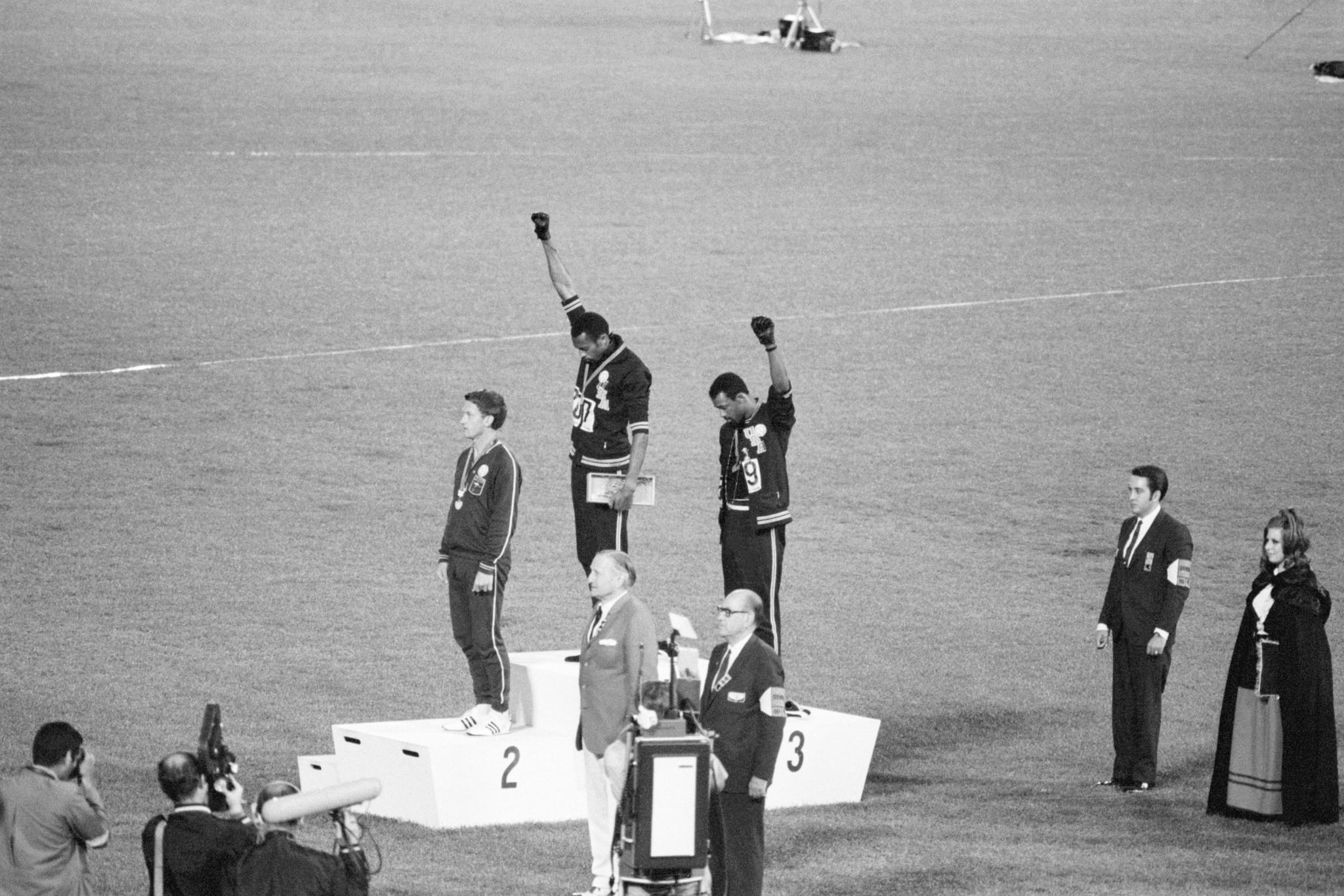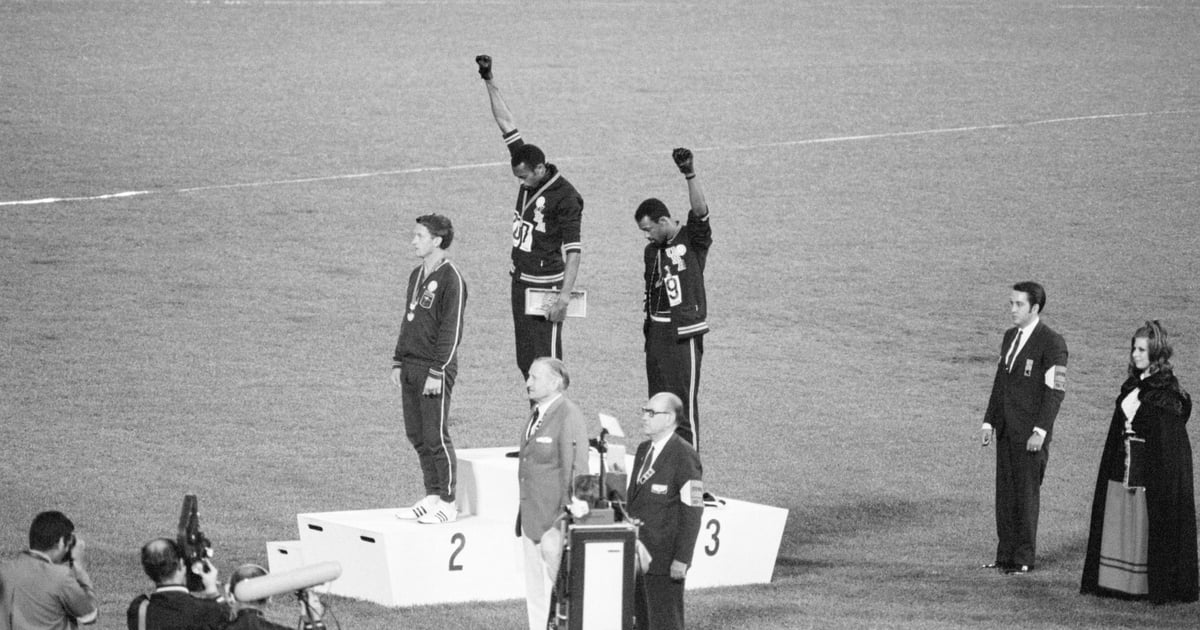
Photo: American sprinters Tommie Smith (center) and John Carlos (right) demonstrating during the men’s 200-meter medal ceremony at the 1968 Olympic Games.
On March 30, the US Olympic and Paralympic Committee (USOPC) announced participant rules for anyone wanting to demonstrate during the US Olympic and Paralympic trials, stating once again that the committee will not penalize athletes for peaceful protests regarding social or racial justice. This came after the USOPC said in December of 2020 that it will no longer penalize athletes who choose to take part in peaceful protests. The committee is supporting the efforts of the Team USA Council on Racial and Social Justice, which released its recommendations for amending longstanding policies put in place by governing bodies International Olympic Committee (IOC) and International Paralympic Committee (IPC) — the policies were evaluated by the council’s Protests and Demonstrations Steering Committee formed last year.
The USOPC will allow people to kneel during the national anthem; wear a hat or face mask that says “Black Lives Matter,” “Trans Lives Matter,” or words like “equality” and “justice;” speak about equal rights for marginalized and underrepresented communities; and advocate against police discrimination. It will not, however, condone demonstrations that advocate “specifically against other people, their dignity, or their rights.” This includes hate speech, racist propaganda, or discriminatory language. Demonstrations that violate laws, cause physical harm to others, or “physically impedes or discourages Trials or medal ceremony participation by another Participant” are also not condoned.
These rules do not apply to the Olympic or Paralympic Games this summer, and the IOC and IPC have not issued their respective policies for the upcoming Games. “While we support your right to demonstrate peacefully in support of racial and social justice, we can’t control the actions others may take in response,” USOPC CEO Sarah Hirshland wrote to athletes in a separate open letter.
For some context, Rule 50 in the IOC Olympic Charter states, “No kind of demonstration or political, religious, or racial propaganda is permitted in any Olympic sites, venues or other areas.” IPC Handbook Section 2.2 features similar language. In January 2020, the IOC Athletes’ Commission clarified that though the IOC is supportive of freedom of expression, examples of prohibited acts include: “Gestures of a political nature, like a hand gesture or kneeling.” It also specified the designated areas where this rule applies: on the field of play, in the Olympic Village, at Olympic medal ceremonies, and during the opening and closing ceremonies.
One athlete who was reprimanded for protesting? Gwen Berry. At the 2019 Pan American Games, she raised a fist and bowed her head on the podium when accepting a gold medal for the hammer throw. She, along with fencer Race Imboden, who won gold in his sport at the Pan Am Games that year as well and took a knee, demonstrated separately but for the same cause: racial and social justice. The USOPC put them both on a 12-month probation.
Five decades prior was the iconic protest in 1968 from American sprinters Tommie Smith and John Carlos. Atop the Olympic podium for the men’s 200-meter medal ceremony in Mexico City, each raised a fist while the national anthem played. Their demonstration is referred to as the Black Power salute, though Smith wrote in his autobiography that the action was more than that; he said it was a demonstration for human rights. What was then known simply as the US Olympic Committee wanted to issue a warning, but after pressure from the IOC, the men were expelled from the Games.
“The silencing of athletes during the Games is in stark contrast to the importance of recognizing participants in the Games as humans first and athletes second.”
Fast forward to 2020, Team USA Council on Racial and Social Justice stated in its initial recommendations: “The silencing of athletes during the Games is in stark contrast to the importance of recognizing participants in the Games as humans first and athletes second. Prohibiting athletes to freely express their views during the Games, particularly those from historically underrepresented and minoritized groups, contributes to the dehumanization of athletes that is at odds with key Olympic and Paralympic values.”
The council urged the IOC to recognize that protests in the name of human rights and social justice are not “divisive disruptions,” as the IOC has formerly called them. Additionally, the council wrote, “We want to make unmistakably clear that human rights are not political; yet, they have been politicized both in the U.S. and globally to perpetuate the wrongful and dehumanizing myth of sport as an inherently neutral domain.”
By trying to keep sports “neutral,” this, the council argued, targets “historically marginalized and minoritized populations within the Olympic and Paralympic community, most notably Black athletes and athletes of color, who have competed and excelled in Olympic and Paralympic Games against the backdrop of various social injustices and turmoil.”
Taking into account the demonstrations we’ve seen from professional athletes across sports specifically, it’s unknown what any such protests at this summer’s Games will bring as the IOC and IPC have ultimate authority. According to the Washington Post, the IOC Athletes’ Commission has been reviewing Rule 50 and could make a recommendation on that rule before the Games.
Though the IOC did not initially mention a timeline, the IPC said its Athletes’ Council would present final recommendations to the IPC Governing Board by late February. POPSUGAR has reached out for clarification on if this meeting did indeed take place and where the IPC stands. Until then, athletes can demonstrate peacefully without fear of penalization at the Olympic and Paralympic trials taking place in the US in the coming months.
